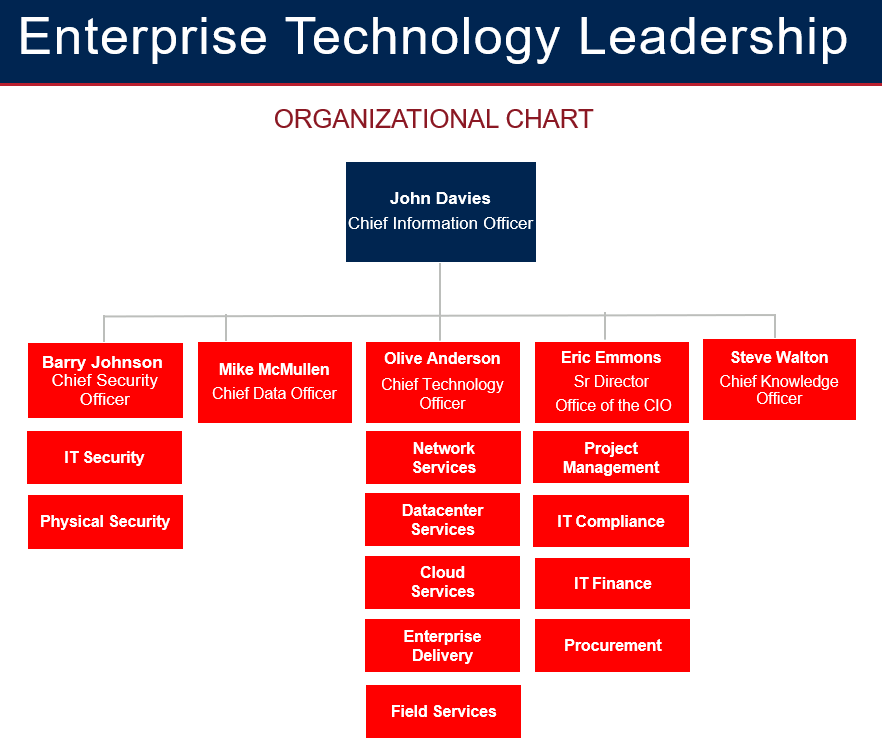
According to Parker (2022), the importance of technology in the modern era is changing IT roles in organizations. Nothing could be more true when looking at our robust IT executive leaders. We will take a few minutes to familiarize you with the leadership roles and what their responsibilities include.
CIO (Chief Information Officer): this role is responsible for overseeing a company’s technology strategy and aligning it with business goals. While the role used to be highly technical, it has evolved to be more strategic due to advancements in technology. A successful CIO today combines a deep understanding of technology with a strong commercial perspective, continuously assessing trends, developments, and opportunities that can benefit the business.
Key responsibilities of a CIO include driving the company’s technology strategies, leading digital transformation efforts, and integrating new technologies to streamline operations and improve efficiency. The CIO is a crucial player in shaping the company’s technological landscape and ensuring that it aligns with overall business objectives.
Project managers, IT compliance employees, IT finance teams and technology procurement roles report to the Sr Director Office of the CIO, with the ultimate authority in these areas being handled by the CIO.
CSO (Chief Security Officer): This role is responsible for safeguarding a company’s digital assets by developing and implementing robust cybersecurity measures. As businesses increase their digital touchpoints, the risk of exposure to cybercrime also rises, making the role of the CSO crucial.
The CSO works alongside other technological leaders to ensure that every innovation is secured against cyber threats. They are valuable for businesses undergoing rapid digital transformation, as they help mitigate cyber risks throughout the process while allowing the company to remain flexible. Additionally, CSOs play a key role in educating the organization about cybersecurity threats, promoting a top-down approach to security, and guiding the development of a cohesive cybersecurity strategy across the entire business.
CDO (Chief Data Officer): This role is responsible for managing and leveraging a company’s data as a strategic asset. In the data age, the CDO plays a critical role in overseeing four key aspects: Governance, Operations, Innovation, and Analytics.
The CDO ensures that data quality is maintained, guides how the business uses data, and finds new ways to extract commercial value from it. With increasing data regulations like GDPR, the role of the CDO has become even more important, as poor data security can have severe legal and commercial consequences. While the CDO might oversee data protection and security, in many businesses, this responsibility has grown so significant that it is handled by a separate C-level executive, the Chief Information Security Officer (CISO).
Overall, the CDO’s role involves not only safeguarding data but also driving its strategic use to benefit the business.
CTO (Chief Technology Officer): According to Woollacott (2024), the CTO is the most senior technology executive within an organization, responsible for shaping technology strategy and aligning it with the company’s overall business goals. The CTO plays a crucial role in both internal process optimization and product development.
CTOs collaborate closely with other senior executives, such as the Chief Financial Officer (CFO), Chief Operating Officer (COO), and other senior tech staff. The CTO guides the company’s technological direction from the outset.
CKO (Chief Knowledge Officer): According to Peters (2021), the CKO is responsible for managing and enhancing a company’s knowledge assets. Their duties include identifying core knowledge within the organization, treating knowledge as a valuable asset, and developing strategies to improve and leverage it. CKOs manage how knowledge is stored, accessed, and shared, both digitally and physically, and they produce resources like manuals and training programs. They also handle intellectual property matters and explore technological solutions to improve knowledge access. Additionally, CKOs advise leadership on knowledge strategies to maintain a competitive edge and ensure long-term knowledge preservation and enhancement.
